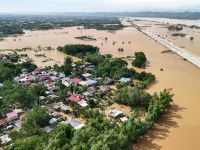US forces stepped up their hunt Monday for Osama bin Laden, bombarding the vicinity of his suspected cave hideout in eastern Afghanistan, while anti-Taliban groups in Bonn said they reached a power-sharing deal after a week of tough talks.
The US pounding of the Tora Bora area came after some 20 US special forces aboard two helicopters landed Sunday in Jalalabad, about 50 kilometers (30 miles) north of the cave bunkers, the Afghan Islamic Press (AIP) news agency reported.
At the airport 20 kilometers south of Kandahar, the final remaining Taliban stronghold, opposition forces backed by massive US air strikes said they were engaged in heavy fighting with militia troops inside the facility.
The Pakistan-based AIP, quoting "informed sources", said the US troops in Jalalabad were expected to discuss plans for an operation in Tora Bora with the Nangarhar provincial authorities.
AIP, quoting Nangarhar police chief Hazrat Ali, said 58 civilians were killed by US bombardments around the caves Sunday night and Monday.
Tora Bora, in the rugged White Mountains, is reachable only by foot or horseback and comprises a network of 30 to 40 mostly interconnected caves.
Locals say mujahedeen fighting the Soviet occupation of Afghanistan in the 1980s fortified and expanded the reputedly impregnable complex with new tunnels and large caches of arms.
The United States wants bin Laden and al-Qaeda for the September 11 terror attacks that killed more than 3,500 people in New York and Washington, and the Taliban and its leader, Mullah Mohammad Omar, for sheltering them.
In Bonn, a Northern Alliance source told AFP that "complete agreement has been reached" on a post-Taliban administration and will be formally signed on Tuesday.
He said a royalist will head the six-month interim government while other groups at Bonn will share cabinet portfolios "according to their weight."
Royalist sources said they proposed delegation chief Abdul Sattar Sirat as interim premier.
Alliance foreign minister Abdullah Abdullah said his group would keep the defense portfolio, currently held by Mohammad Qasim Fahim, successor to the legendary Ahmed Shah Masood, who died after an attack two days before the September 11 attacks by presumed al-Qaeda assassins.
Northern Alliance leaders in Kabul said they had authorized their delegation in Bonn to choose from among four names -- Sirat, Pashtun spiritual leader Pir Sayed Ahmad Gailani, former president Sibghatullah Mujadadi and Pashtun tribal leader Hamid Karzai, currently engaged in the battle for Kandahar airport.
A diplomat close to the talks details of some amendments were being incorporated into a clean text in English, Pashto and Dari, in a lengthy and laborious translation process.
The diplomat said the UN has yet to receive a list of Alliance nominees for government posts, but the Alliance source this would not prove a problem as the question was one of quotas rather than names.
The deal came as the Alliance's nominal leader Burhanuddin Rabbani, the UN-recognized former president of Afghanistan, floated the idea in an interview with the Washington Post of an interim government that would keep his coalition in control for up to six more months.
The reason, he explained, would be to allow the Alliance to investigate al-Qaeda "because our people must know about this, why they came to Afghanistan to kill our people.
"Then we will discuss it with the Americans," he said.
Rabbani said if his troops capture Mullah Omar, bin Laden or any top al-Qaeda cadre, he will not turn them over to the United States until Afghanistan conducts its own investigation.
US Defense Secretary Donald Rumsfeld has said that Washington expects the Alliance to hand over such figures for trial before US military courts.
Delegates at the talks in Bonn also appeared to be heading for some sort of compromise on a proposed multinational peacekeeping force, which the Alliance has been reluctant to accept but on which the other militarily weaker groups have insisted.
With massive US air support, anti-Taliban fighters Monday said they entered the Kandahar airport after approaching it from two flanks.
"We have entered into the airport," said a spokesman for former provincial governor Gul Agha. "The battle is going on at the moment. We can hope but I am not 100 percent sure we will capture it by the end of the evening."
"There was severe fighting between us and the Taliban," he said. "We have lost 12 fighters but they have lost at least three times as many."
Earlier, a spokesman for Karzai, who is approaching the airport from the southwest, told AFP that their forces were within sight of the airport, which is about 20 kilometers south of Kandahar, and hoped to take it during the day.
Kuwait's Al-Qabas newspaper reported that bin Laden's Kuwait-born spokesman Sulaiman Abu Ghaith was possibly mortally wounded during recent fighting.
Abu Ghaith, now stripped of his nationality, was "seriously wounded" in Kandahar and may have died, it said, quoting Pakistani sources.
The final push for the airport came as Rumsfeld warned the Taliban to surrender Kandahar or die and an officer with a US Marine task force at a new desert base some 110 kilometers (70 miles) to the southwest said US troops could join tribal forces in an assault on the city.
A wave of US Air Force C17 cargo planes and Marine Corps KC130 Hercules planes landed at the base throughout the night, sending up clouds of dust as they offloaded extra armored vehicles and tank-busting Humvees.
"They have significantly augmented the robust firepower that we currently have here," said Captain David Romley, spokesman for the 15th Marine Expeditionary Unit that seized the airstrip on November 25.
By morning, the camp's makeshift parking lot was filled with an array of materiel including light armored reconnaissance vehicles mounted with 25 mm guns and all-terrain Humvees loaded with TOW anti-tank missiles, MK-19 automatic grenade launchers or .50-caliber heavy machine guns.
In Kabul, the International Committee of the Red Cross said more than 3,000 Taliban soldiers captured last month in the northern cities of Mazar-i-Sharif and Kunduz are being held in a north Afghan prison.
It said the POWs were gathered at Shibarghan, about 120 kilometers west of Mazar-i-Sharif, whose fall to Alliance forces on November 9 triggered a Taliban rout in the north, culminating with the November 26 surrender of Kunduz.
While no figure has been given for the number of Taliban who surrendered or were captured at Mazar-i-Sharif, Alliance officials said some 5,000 Afghan and 750 foreign militiamen had given up at Kunduz.
The pro-Taliban foreigners were taken to the Qala-e-Janghi prison fortress outside Mazar-i-Sharif, where an estimated 450 of them died last week in a three-day rebellion suppressed by alliance forces and US warplanes.
A coalition spokesman in Islamabad said a man who said he was called John Walker had been delivered to US custody as one of the 80 or so Taliban survivors of the bloody uprising.
Newsweek magazine reported Sunday that a 20-year-old American it named as Abdul Hamid, born John Walker, was taken prisoner by the Northern Alliance after the rebellion -- KABUL (AFP)
© 2001 Al Bawaba (www.albawaba.com)







